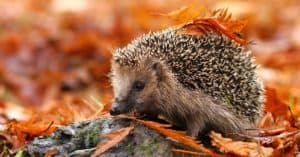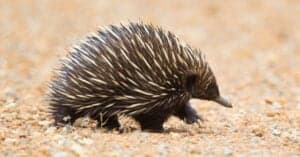In the U.S., we only have pet African pygmy hedgehogs, but overseas, there are numerous species of the little spiky fellows. Many people in the U.K. have hedgehogs who visit their gardens and outside cat food nightly, scrounging for tasty morsels. Well-meaning people put everything from raw meat to dried fruit out for the hungry hedgehogs, but can hedgehogs eat fruit? Their diet may come as a surprise to many of you!
What is a Hedgehog?
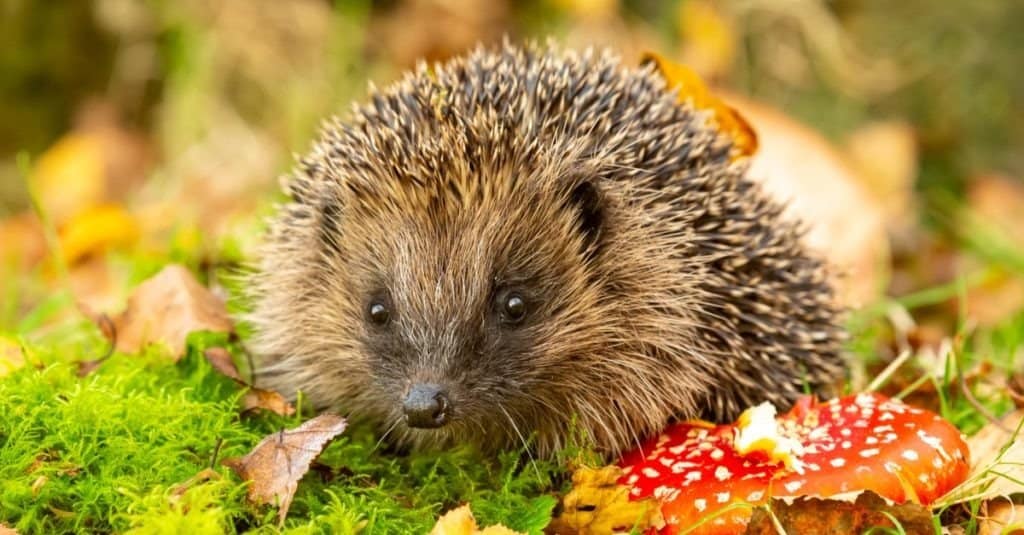
It’s hard to look at this cute face and see a killer, but the invertebrates know otherwise.
©Coatesy/Shutterstock.com
Hedgehogs live in Europe, Asia, Africa, and New Zealand due to introduction to the country. Hedgehogs are quilled members of the subfamily Erinaceinae. Their spiny protection along their upper portion resembles that of a porcupine, though they are not related.
When threatened, the only defense the small mammals have is to roll into a tight ball with their needle-like quills standing up. However, some desert species of hedgehogs have fewer quills and may be seen fighting by attacking the threat with their quills or even running away. They are all also known to be highly territorial and will fight to the death. This is much more typical when it is mating season. Males are known to attack each other even when there is no threat.
Facts About a Hedgehog’s Diet
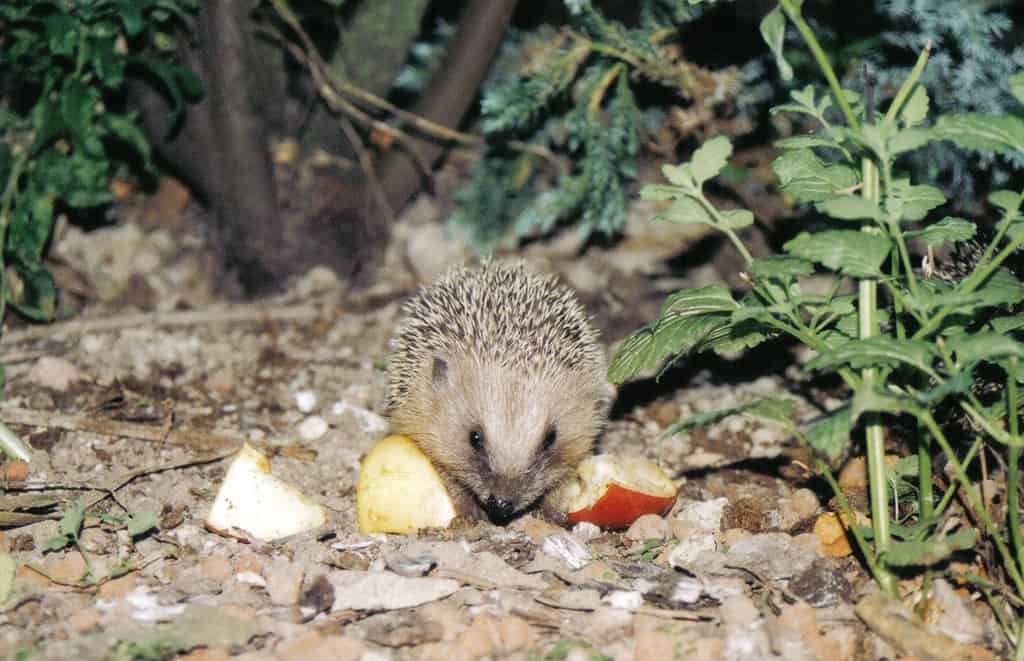
This European hedgehog (Erinaceus europaeus) is sniffing at some cut apples and trying to decide if they would make a good meal.
©Vera Buhl / CC BY-SA 3.0 – License
1. Hedgehogs Are Omnivores
The little balls of spikes are quite opportunistic when it comes to what they will eat. Wild hedgehogs will eat just about anything they can find. Unfortunately, a lot of what people leave out for them isn’t healthy or safe for them to eat. In the U.S., pet African pygmy hedgehogs are often fed “hedgehog food” sold online or at pet stores. Sadly, most do not provide the hedgehog with the correct amount of vitamins, minerals, and protein required. Because of this, many hedgehogs have premature deaths. Many experienced hedgehog owners feed a combination of high-quality dry cat food, black soldier fly larvae, and some dried insects nightly. Once or twice a week, hedgehogs can have wet cat food, eggs without seasoning, and very small portions of vegetables.
2. They Love Insects
Hedgehogs will eat almost any insect or other invertebrate they come across. Their diet is made up of 80 – 90% invertebrates, and that means insects! The small, quilly creatures love worms, beetles, caterpillars, snails, slugs, grasshoppers, bees, and any other invertebrate they might stumble upon. On any given night, a hedgehog can consume 100 invertebrates! They love gardens, and it’s no wonder why people enjoy having them there.
Hedgehogs also enjoy feasting on frogs, voles, baby birds, eggs, and carrion. They will eat any type of small dead animal they find, including other hedgehogs. Unfortunately, any of these choices can mean death if the animal or insect being eaten has been poisoned or contains parasites.
3. Hedgehogs Are Prone to Serious Dental Issues
Hedgehogs mustn’t eat very much soft food, especially anything sticky. Since they cannot brush their teeth, soft food can build up and cause rotting over time. With a painful dental issue, a hedgehog will avoid eating and starve to death. If a hedgehog’s teeth have rotted, fallen out, or broken, it will also face the same ending.
4. Phosphorus Can Cause Bone Problems
One reason prepackaged food sold as a hedgehog diet can be a big problem for hedgehogs is that it can contain too much or too little calcium and also have too much phosphorus in the mixture. Too much phosphorus can block calcium absorption and lead to serious bone issues, specifically metabolic bone disease. Always check with a hedgehog diet expert before combining foods. There is no way to reverse metabolic bone disease. Avoid mealworms because they are very high in phosphorus.
5. Hedgehogs Are Lactose Intolerant
Hedgehogs will happily lap up milk and eat ice cream or other dairy products, but they shouldn’t. They are lactose intolerant, and dairy can make them painfully bloated, have diarrhea or constipation, or stop eating for a while. A very small amount of yogurt or a little cheese from time to time will not kill them, but make sure it’s only served as an occasional treat. Never put these foods out for a wild hedgehog since their circumstances are much different.
6. They Are Called Hedge “hogs” for a Reason
Wild hedgehogs need 130 calories and roughly 75 grams (three ounces) of food per night to survive. They will fill their stomachs twice in one night of feeding. This means they eat 8% of their body weight every day. A person weighing 200 pounds would need to eat 16 pounds of food each day to survive! In all fairness, these small creatures also travel approximately 1.2 miles every night in search of food. In the mating season, the males can travel two miles a night. That’s far, considering their small size!
Can a Hedgehog Eat Fruit?
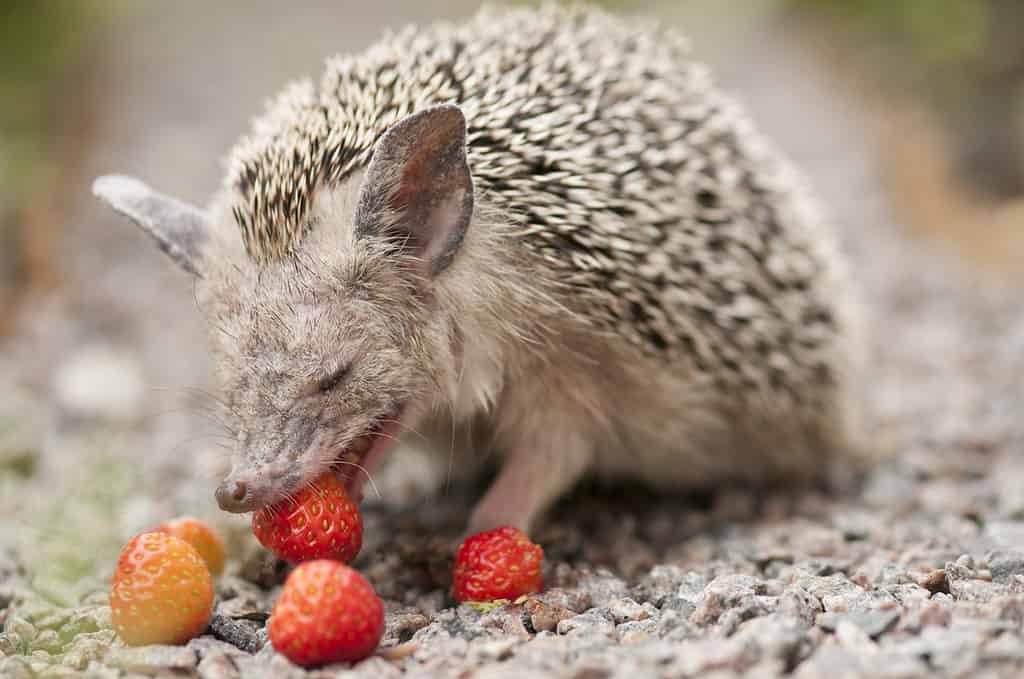
Hedgehogs like fruit a little too much!
©VarvaraIvanova / CC BY 4.0 – License
Occasionally, people have witnessed hedgehogs in the wild eating cherries, strawberries, and some melons. Fruit is not necessarily bad for hedgehogs; it’s bad for their teeth and can fill them up. With too much fruit, they do not forage for insects—protein and calories from meat need to make up 80% of their diet. A little bit of fruit from time to time is perfectly fine as a treat, but be sure not to offer too much of it, as it can cause diarrhea, which can be dangerous in hedgehogs and other small animals.
If you choose to offer a small amount of fruit for your outside visitors or your pet hedgehog, make sure to wash the fruit thoroughly first. Only offer organic fruit since pesticides have a way of getting into the actual fruit and not just on the outer skin. Cut up the fruit into small dime-sized pieces so your little friend doesn’t choke. Some safe fruits to offer your hedgehog are apples, bananas, blueberries, cantaloupe, cherries, honeydew, mango, papaya, pineapple, raspberries, strawberries, and watermelon. Never give dried fruits or raisins. They contain too much sugar and can cause severe diarrhea.
The photo featured at the top of this post is © Martina Vasquez / CC BY-SA 4.0 – License / Original
Thank you for reading! Have some feedback for us? Contact the AZ Animals editorial team.



